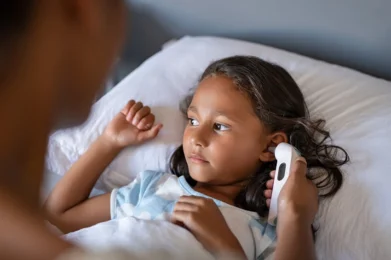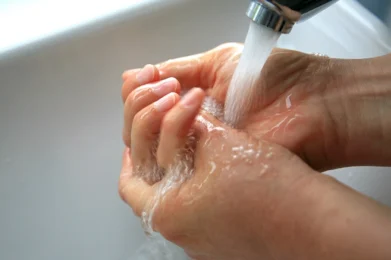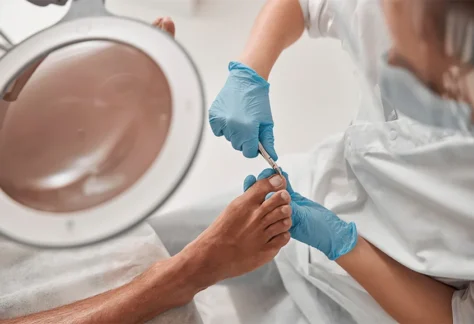In This Article:
- No matter your child’s age, make sure they receive the proper vaccinations at the right time. Watch for symptoms of asthma, allergies and other sicknesses. Also, limit screen time and sugary drinks.
- Toddlers start speaking and potty training at different times. Tantrums and bed wetting are normal at this age – to an extent. Also, your child should ride in a booster seat until they reach 4’9”.
- For tweens and teens, be prepared to deal with moodiness, bodily changes, bullying, mental illness, peer pressure and more mature topics as your child begins to transition into adulthood.
As your child grows, they’ll experience a series of growth and development milestones unique to their age group. Over the years, Valleywise Health has received many questions from parents who want to ensure their child is developing normally.
While each child is different, our District Medical Group pediatricians are here to address parents’ most common concerns and provide general guidance with this comprehensive Q&A.
FAQ for All Ages
When should my child get vaccinated?
According to the CDC, you should vaccinate your child against 16 infections throughout childhood. Some require one shot, while others require multiple. Most vaccines should be completed by age four, but some — like Meningitis B and HPV — are recommended for older tweens and teens. Children six months and older should also receive a yearly flu shot.
These easy-to-read charts from the CDC will help you determine when to vaccinate your child against each infection, from birth to six years and age seven to 18.
How do I know when to visit a pediatrician or go to the ER?
Valleywise Health doctors are here for you and your child 24/7, and we’ll be happy to direct you to in-office or at-home care. However, visit a pediatrician immediately if your child exhibits any of these signs:
- Difficulty breathing
- Lethargy or difficulty waking
- Inability to eat or drink
- Abnormally high fever
- Emergencies, like a car accident or a fall
How can I differentiate between a common cold and something more serious?
Since the pandemic began, we’ve all learned how important it is to identify the warning signs of different viruses. Here are some symptoms you should look for when determining whether your child has a cold or flu:
Colds include runny nose, sore throat, cough, congestion and sneezing.
Flu includes vomiting, diarrhea, high fever, chills, fatigue and body aches.
Regardless of their condition, never hesitate to visit a pediatrician if you are concerned about your child’s health.
Which medicines are okay for children to take?
Generally, you should not give cough syrup to children under four years of age. You should also not use honey as a coughing remedy for children younger than one.
Also, keep in mind that antibiotics are not an effective treatment for viruses like the cold or flu.
Reach out to your pediatrician any time you start a new medication. When it comes to switching to adult medications, make sure your child is at an appropriate weight to handle a larger dose.
Does my child have asthma?
Asthma requires a clinical diagnosis after your child exhibits coughing, wheezing or shortness of breath triggered by exercise, a cold or something in the environment. This condition often runs in the family, so if you think your child has asthma, visit your pediatrician for an exam.
What about food allergies?
If your child has a repeated reaction after eating a certain food, they may have a food allergy. Look for rashes, swelling, an itchy throat and watery eyes — and seek care immediately if you notice these symptoms. Allergic reactions can be life-threatening.
How do energy and sports drinks affect children?
Pediatricians don’t recommend sports drinks for children of any age unless they exercise very intensely since they contain a lot of sugar. Even then, water is a healthier and more effective way to hydrate.
Energy drinks can produce serious side effects. They often contain so much caffeine that many teens have ended up in the emergency department for dehydration, anxiousness and heart palpitations. As with any food or drink, pay close attention to labels and play an active role in deciding what your child puts into their body.
How much screen time should I allow my child?
Children under two should avoid screen time entirely. If they do get screen time, make sure you engage with your child while they use the device.
Older children shouldn’t exceed more than two hours of screen time per day, but this can be difficult —especially with online schooling. The most important thing is to make sure your child spends plenty of time engaging in screen-free activities like exercise, art or music. This is crucial for both their mental and physical well-being.
How can I prevent my child from getting head lice?
Tell your child to never share combs, brushes, barrettes, scrunchies or hats with their friends. However, sometimes lice can seemingly appear out of nowhere. This is very common and doesn’t mean your child has bad hygiene. You can usually get rid of it with lice-removing shampoo and a fine-tooth comb.
FAQ for Toddlers
When can I expect my child to start talking?
Your child will likely say their first words between nine months and one year.
When should I start potty training my child?
Most kids start potty training around two years, but everyone is different. Look for signs that show they are ready. If your toddler can pull their pants up and down and let you know when their diaper is wet, it may be a good time to start trying out the toilet.
You should never make potty training a negative experience for your child. Encourage them when they go, but don’t punish them when they don’t. Prepare for accidents, stay patient and work together.
Are tantrums normal, or are they a sign of behavioral issues?
Tantrums are a normal part of development, especially for children between ages one and three. Toddlers have many emotions but often can’t express them maturely to get what they need. This will come with time. However, if tantrums become excessive, you may want to visit a pediatrician.
Is bedwetting normal?
Yes. It’s common for even potty-trained children to still have the occasional accident. Don’t punish your toddler for this because they can’t help it. Instead, avoid liquids before bedtime or set an alarm to take your child to the bathroom in the middle of the night. If you still have concerns, make sure to talk to your pediatrician.
When does my child no longer need a car seat?
Pediatricians recommend that your child stays in a booster seat until they reach 4 feet, 9 inches tall. Most children hit this height between ages eight and 12. This may seem like a long time to stay in a car seat, but vehicle accidents are among the top causes for injuries or death in children. It’s always better to be safe than sorry.
FAQ for Tweens
How can I help prepare my tween for puberty?
Be open, be honest and be real. You will likely have to start the conversation since kids are usually shy about these topics. Make sure they know that they aren’t alone. Everyone goes through these changes, but they happen at different times for different people. If your child feels comfortable talking to you and their pediatrician about puberty, they will have an easier transition to their teens.
FAQ for Teens
How should I talk to my teen about tough topics?
Once again, openness and honesty are key. Conversations about drugs, alcohol and sex can be challenging, but children need to know they can come to you with any issue. Check in with your teen frequently to make sure no major issues stem from their school, home, social or love life.
What about bullying?
Now more than ever, it’s tough to be a teen. Phones and social media have made bullying and unrealistic beauty standards more prevalent. If someone is bullying your child or they are a witness to bullying, tell them to talk to a trusted adult. As a parent, you should also be a good role model who preaches self-acceptance and kindness toward others.
The later you introduce your teen to social media, the less it will affect their perception of life. Try to wait until they are an older teen, and even then, set time limits and track their activity on each app.
Is my teen experiencing mood swings or depression?
For teens, moodiness is nothing to worry about — but an underlying mental illness is. We’ve seen an increase in mental illness among teens today, so look for these signs of depression and anxiety:
- Extreme irritability
- Abnormal sleeping patterns
- Changes in appetite
- Any other unexplained behavioral changes
Pediatricians screen for depression and other mental health disorders during well child checks, so be sure to take them in for a physical every year. We work closely with social workers and care coordinators who can help your teen get the help they need.
At what point should my teen transition from pediatric to adult care?
Although some pediatricians will see their patients up to 21 years of age, 18 is usually a good time to make the switch.
From infancy to adulthood, Valleywise Health pediatricians are always here to help you and your child navigate the challenges of the many growth and development milestones they will face.








